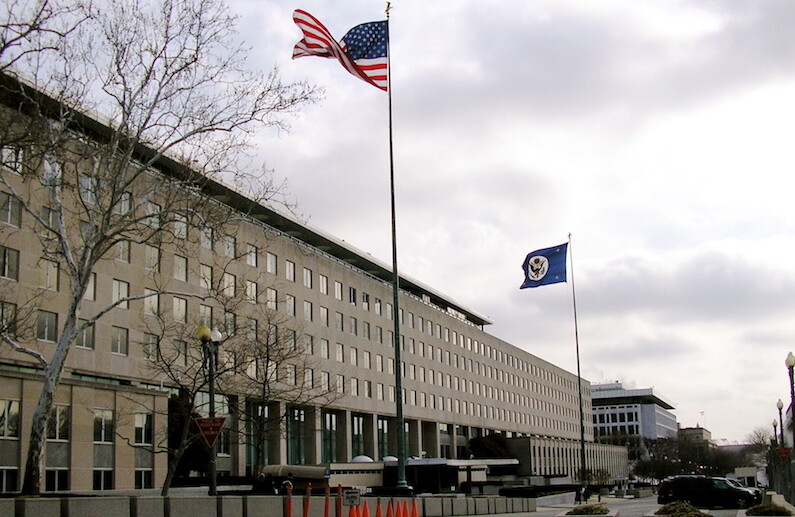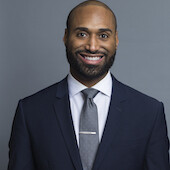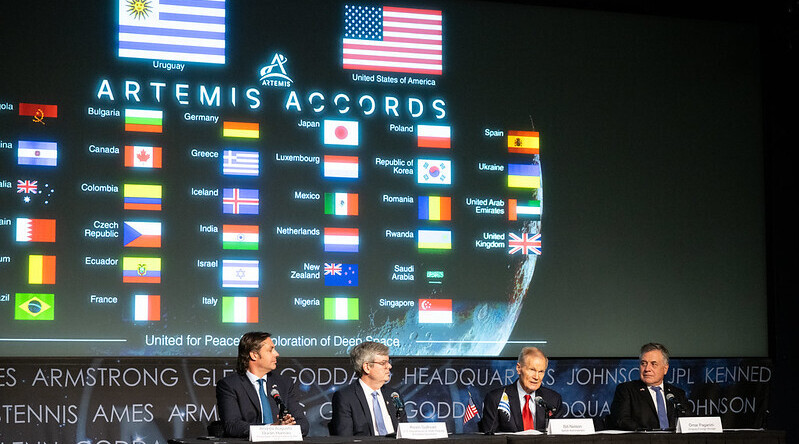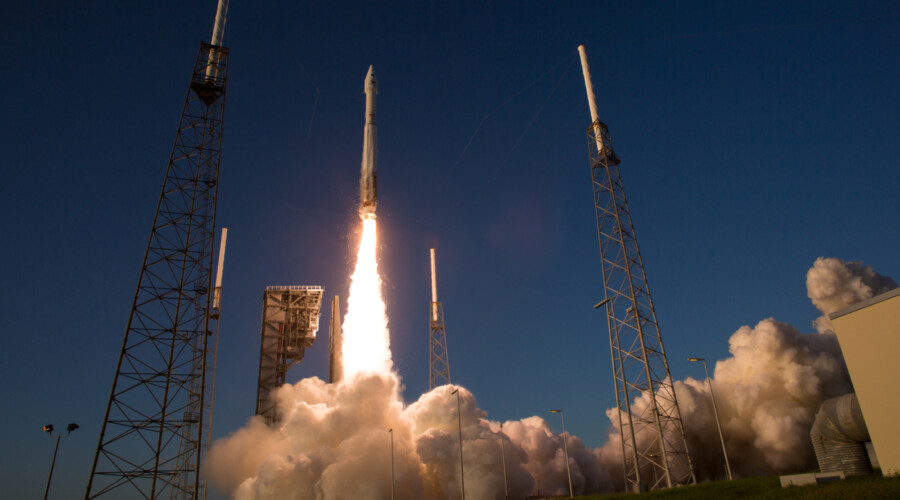In discussion with Brian Mateo, a member of the Carnegie New Leaders program, Elmira Bayrasli discusses her work as CEO of Foreign Policy Interrupted, an organization dedicated to amplifying women's voices in interntionl affairs. Plus, she speaks about the future of foreign policy, including the effect of social media and other technological developments.
BRIAN MATEO: Welcome to the Carnegie New Leaders interview, a series where members of the CNL program identify leaders in their field and ask these experts critical questions about ethics and leadership. Our aim is to help our audience understand why ethics matters in everything from academic research to technological developments to international affairs.
My name is Brian Mateo, a member of the Carnegie New Leaders program and an employee at Bard College. I work with faculty to develop courses related to experiential learning, U.S. public diplomacy programs, and providing civic engagement opportunities for our students. Any opinions I share today are my own and not those of Bard or Carnegie.
I am so very pleased to be here today with Elmira Bayrasli. Elmira is the CEO of Foreign Policy Interrupted and a professor at the Bard Globalization and International Affairs Program. She is also the host of Opinion Has It, a podcast produced by Project Syndicate. That is a just a small glimpse of her impressive background.
Elmira, thank you so much for joining us today.
ELMIRA BAYRASLI: It's so great to be with you, Brian.
BRIAN MATEO: You have traveled around the world to meet entrepreneurs who are solving issues in their communities, and you also wrote a book called From the Other Side of the World: Extraordinary Entrepreneurs, Unlikely Places. In your opinion, what has allowed entrepreneurs to expand more rapidly than before?
ELMIRA BAYRASLI: One of the reasons I set out to write my book, From the Other Side of the World, was primarily because when we say the word "entrepreneur" we automatically think of people like Bill Gates or Mark Zuckerberg or Steve Jobs, and we associate it very much with Silicon Valley and technology and big companies like Microsoft, Apple, and Facebook. When you say the word "entrepreneur" in the context of Africa, Asia, Latin America, or the Middle East, I think most people think of women on the side of a dusty road selling tchotchkes. One of the reasons that I wanted to write this book was to dispel that image and essentially the myth that entrepreneurship is something that only Americans do or that only white men do out in California. The reality is more people are entrepreneurs outside of the United States than they are within the United States.
In traveling the world one of the things that I noticed and what compelled me to write the book was essentially that there were men and women who were leading very high growth, investment-worthy enterprises that were doing things that run the span of financial services, technology, retail, and other service-oriented startups. Those stories were not being told, particularly in the United States, and I thought it was profoundly important to tell those stories, (1) so that we can learn from those entrepreneurs who had built high-growth enterprises, whether it's in Nigeria, Pakistan, Brazil, South Africa, or Turkey, and really learn and understand how those people did it under very dire conditions; and (2) to really reframe how we actually look at entrepreneurship around the world.
BRIAN MATEO: In your book you mention that one of the elements that makes entrepreneurs successful is access to public spaces. Do you consider social media platforms an avenue for innovation, and if so, how do censorship laws inhibit that?
ELMIRA BAYRASLI: That's a great question. One of the things that I noticed when I went to Pakistan and met Monis Rahman, who is a technology entrepreneur, is that one of the biggest challenges a place like Pakistan has is the lack of public spaces. When I went to Pakistan I had in my head that insecurity was one of the biggest challenges that people in Pakistan face. We constantly hear about bombings and assassinations, and certainly Osama bin Laden had found a haven in Pakistan, so there's a certain image conjured in the Western mind about the challenges that a Pakistani faces. Yet when I was there and got to know Monis and his business, the one thing that I actually realized is that, in Pakistan, one of the reasons that you haven't had a lot of economic prosperity or growth is the challenge of people coming together physically.
Pakistan is a very mountainous country. It has very rough terrain, and infrastructure is poor, so infrastructure is definitely a challenge. But you also have the fact that, culturally and religiously, men and women are separated, whether it is in the mosque where they worship or in the military barracks, and there are very few opportunities for people to come together. There are very few public spaces like parks or libraries where people can convene, and what I saw Monis do and succeed at was creating platforms. One was a dating website, which is profoundly important, and the other was a job search engine, which again I think really brings people together.
To answer your question about social media, I think social media addresses and overcomes the challenge of "How do people come together and interact with people they might not otherwise interact with?" I think social media also then creates another problem where they might then just isolate themselves into echo chambers and only listen to people who believe in the same thing that they do.
In terms of censorship, where that really comes in is how government leaders are using the Internet and social media platforms. It's interesting. I teach a class at the Bard Globalization and International Affairs Program, and early on we hear about, in the late 1990s, when the Internet really started to become widely used how most people thought, This is going to really bring democracy to people, how China was no longer going to have a hold on communism and be a totalitarian state. But what we have actually seen, is how a lot of these authoritarian rulers really utilize social media and the Internet to their own benefit to either silence opponents, to silence certainly human rights activists, and to really control messages that might be against their leadership and messages that they want to get out to the public.
BRIAN MATEO: Speaking of the course that you teach at the Bard Globalization and International Affairs Program, which is called "Foreign Policy in the Digital Age," you describe where foreign policy is heading today. In your opinion, how has the Internet revolutionized foreign policy, and where do you see this going?
ELMIRA BAYRASLI: It's interesting. I start out my class with the notion of power and having the students really understand what is power: How do you gain it? How do nation-states gain power? The other thing we start out with is understanding the world order as we know it from the 20th century, the Westphalian world order.
The Internet has really changed foreign policy because it has changed the very nature of power and who holds it. It used to be that governments really had the monopoly on not only declaring war but on things like collective action in terms of communicating information to people or on governance; if you needed something done in your community, you went to the government to do it. That's no longer true. Now we get the same information that the government does pretty much at the same time.
If you look at 2011 and the Arab Spring, the White House was getting the same information that all of us were getting on the ground. So information has changed in the sense that we have gone from being an audience to being participants in it and being engaged in it.
So we don't have to wait for the government to do things. If we want to start a community garden, if we want to start a political organization, if we want to do any of these things, we can use the Internet to do that. So what the Internet has done is it has empowered individuals; it has certainly empowered groups, and that can be good and bad, because if we take a look at extremist groups that use the Internet like al-Qaeda, the Taliban, and the Islamic State of Iraq and Syria (ISIS), they definitely have benefited from using the Internet.
In general, it has changed our relationship with the nation-state because borders are no longer really that relevant. How that impacts foreign policy is, is it being driven by individuals and these non-state actors, or is it being driven by governments? The one thing that you can firmly say is that no longer is foreign policy made in oak-paneled rooms by a bunch of white men in suits, smoking cigars. It really is made on the frontlines, whether it's in Tahrir Square in Egypt or it's being made in Venezuela or it's being made in China or in any other location around the world.
The Internet has definitely made it, I think, more difficult for governments to formulate a foreign policy in a longer-term sense. I think a lot of foreign policy today is definitely done for short-term gains.
The other way that the Internet has fundamentally changed foreign policy is that it has empowered strongmen. You see Xi Jinping, the leader of China, use censorship controls and all sorts of other technologies to control what happens within China. You have also seen leaders like Narendra Modi in India, Recep Tayyip Erdoğan in Turkey, Viktor Orbán in Hungary, and certainly Vladimir Putin use the Internet again to their own benefit, and that has had a profound impact in how they are relating with the Western world, with the United States, and with this so-called "liberal world order."
BRIAN MATEO: What would someone conducting foreign policy today need to understand that was not necessarily something that was critical a decade or two ago?
ELMIRA BAYRASLI: I think foreign policy making today really goes back to what we just talked about in terms of how power has changed and how, not only leaders, but individuals' relationships with the nation-state has changed. I think if a leader is developing a foreign policy, there are so many other factors that go into it now. Not only do you have public opinion, but you certainly have these technology companies that are really influencing how technology is being used but also influencing foreign policy issues.
You can take the example of Facebook. Facebook has a program called Free Basics, where it initially tried to go into India, which has a very large population. Essentially, that is the Internet brought to you by Facebook, according to Facebook's rules. India eventually said no to that, and Facebook took this program then to Africa, Latin America, and a lot of countries around Asia. So the challenge you have as a leader, if you are the president of the United States, is people are getting things like Facebook or they're interacting with the Internet, that is according to what Facebook believes people should get.
That has become a problem, particularly in African countries where African governments have gone into partnerships and collaborated with Facebook and are basically controlling what kind of information that particular public is seeing. I think a decade or two ago you really didn't have these barriers for government officials or government leaders in order to actually communicate information.
I also don't want to give this picture that every single leader around the world, let alone U.S. presidents, were angels. Definitely U.S. presidents and, certainly, administrations in the past have done things like invaded other countries and engaged in regime change. I think it's harder for them to do those things now, primarily because the Internet has really just changed the dynamics again of who holds power.
BRIAN MATEO: You also serve as the CEO of Foreign Policy Interrupted, an organization dedicated to amplifying women's voices in this sphere. In 2016 you conducted an analysis in collaboration with Media Matters for America on foreign policy guests on major news programs. The results showed that women made up 24 percent of guests. How can news programs be more inclusive in making sure diverse voices are heard?
ELMIRA BAYRASLI: This is such a critical point. Having only 24 percent of guests be women is really a disappointment, especially in the world that we're living in now. We just talked about all the different challenges that we have in foreign policy. If we are only hearing from a small segment of society, that only puts us further away from the solutions.
Today we are looking at climate change, we're looking at growing extremism, we're looking at growing inequality and poverty, we definitely have global health pandemics. And all of these things are happening at once. You can argue that this is one of the effects that globalization has had, but the reality is that these challenges are all happening at once, and we really can't afford to continue to look at the world through the narrow lens of white men. We really need to have different people coming to the table and sharing their different experiences and their perspectives, in order to actually come up with different solutions.
I believe in diversity, not for the sake of having different people at the table, but the reason that it's really important is because people have different experiences, and we want to actually hear and understand and be informed about those experiences in order to make the best decisions and produce the best solutions.
BRIAN MATEO: Seeing how the Internet has revolutionized foreign policy and the notion of power and seeing how we have other actors coming into play and the lack of representation, what would you say would be needed in order for foreign policy to advance, moving forward?
ELMIRA BAYRASLI: What we really need to do is just fundamentally look at who the gatekeepers and the decision-makers are in foreign policy. Right now they are largely white men. I run an organization that is very focused on women and increasing female voices, but I could—and I actually should—extend that to men of color because we are not hearing from them, and they need to be an important part of the conversation. In terms of how we actually grapple with foreign policy today, we really need to widen the representation that we have and bring people in from diverse backgrounds in order to address a certain set of issues.
When you take a look at climate change or when you take a look at—fighting extremism I think is a great example. Right now we are fighting extremism in the United States through a military lens. Again, I think that is informed because of who is making the decisions. Traditionally, you hear about extremism and you hear about terrorism, and that's a matter that automatically defaults to the Department of Defense and to the military people, so you have generals making decisions.
But we should be looking at the root causes of what is causing people to join organizations like ISIS and what is causing a rise in extremism. A lot of that is actually rooted in poverty, in inequality, and in a lack of opportunity. It's rooted in feeling culturally alienated. If you take a look at how many Arabs or Muslims from Europe migrated into Syria in order to fight in the Syrian Civil War, a lot of them felt very disaffected in the communities they were in, whether it was in France, whether it was in Germany, or whether it was in the Scandinavian countries.
When we take a look at fighting those issues we can't just look at it as, "This is something that we can only combat militarily." There is a cultural, economic, and social element to this, where we need to actually be widening the tools and widening our approach to be able to handle something like growing extremism.
I think there is a wider systemic issue here because not only do you have the decision-makers being predominantly men, you also have professors, deans of schools, op-ed writers, and op-ed editors predominantly being white men. This is a problem, too.
When I did a study looking at the gender breakdown on the op-ed pages of writers who were talking about foreign policy or national security, again the statistics were abysmal. Again, it was less than 25%—in the 21st century! That is very problematic, because if we're not calling on and tapping into the expertise of people who may not be the decision-makers but who are the academics, or who are working at think tanks, or who are outside that nerve center in the Beltway, then we are perpetuating and continuing a problem where we're only looking at foreign policy and national security through a one-dimensional lens. I actually think it's one of the reasons that U.S. foreign policy has really suffered in the past several decades, not just under the Trump administration. If you take a look, I think there were a lot of problems with Obama's foreign policy and most definitely with George W. Bush.
BRIAN MATEO: Thank you for coming again, Elmira. This was a pleasure.
ELMIRA BAYRASLI: Thank you so much for having me, Brian.
BRIAN MATEO: Once again, this was Elmira Bayrasli, CEO of Foreign Policy Interrupted, professor in the Bard Globalization and International Affairs Program, and also the host of Opinion Has It, a podcast produced by Project Syndicate.





